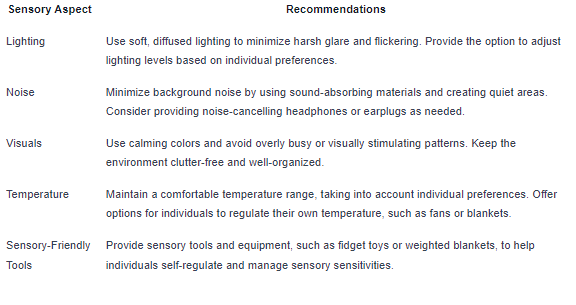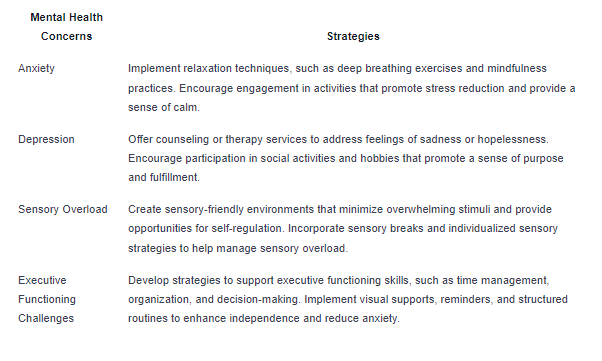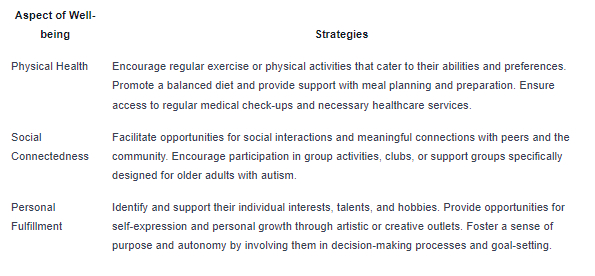Supporting Older Adults with Autism
Empower older adults with autism through tailored support strategies. Unlock their potential for independent living and well-being.

Understanding Autism in Older Adults
Autism Spectrum Disorder (ASD) is a lifelong developmental condition that affects individuals across all age groups. While autism is often associated with children, it is important to recognize that older adults can also be diagnosed with autism. Understanding the unique challenges faced by older adults with autism is crucial for providing appropriate support and empowering their well-being.
Overview of Autism Spectrum Disorder
Autism Spectrum Disorder is a neurodevelopmental condition that impacts social interaction, communication, and behavior. It is characterized by a wide range of symptoms and varying levels of severity. Some common features of autism include:
- Difficulty with social interactions and communication, such as maintaining eye contact, engaging in reciprocal conversations, and understanding nonverbal cues.
- Repetitive behaviors or restricted interests, which may manifest as repetitive movements (e.g., hand flapping), adherence to strict routines, or intense focus on specific topics.
- Sensory sensitivities, where individuals may be over- or under-responsive to sensory stimuli, such as sounds, touch, or lights.
It is important to note that autism is a spectrum disorder, meaning that individuals with autism can exhibit a wide range of abilities and challenges. Each person with autism is unique, and their experiences and needs may vary significantly.
Unique Challenges Faced by Older Adults with Autism
As individuals with autism age, they may encounter specific challenges related to their condition. Some of these challenges include:
- Limited specialized services: Compared to children, older adults with autism may have limited access to specialized services and interventions tailored to their specific needs. This can make it more challenging for them to receive appropriate support.
- Healthcare and aging-related issues: Older adults with autism may face difficulties in accessing healthcare services that understand and accommodate their unique needs. Age-related issues, such as changes in physical and cognitive abilities, can further complicate their healthcare management.
- Social isolation and loneliness: Older adults with autism may experience social isolation and loneliness due to difficulties in forming and maintaining relationships. The lack of social connections can have a negative impact on their mental health and well-being.
- Transition and life changes: Transitioning into retirement, changes in living arrangements, or the loss of a caregiver can be particularly challenging for older adults with autism. These life changes can disrupt their routines and stability, requiring additional support.
Understanding these unique challenges can help guide the development of tailored support approaches and interventions that meet the specific needs of older adults with autism. By addressing these challenges, we can enhance the quality of life and well-being of this population.
Importance of Support for Older Adults with Autism
Support plays a crucial role in enhancing the quality of life and well-being of older adults with autism. As individuals on the autism spectrum age, they may face unique challenges that require tailored support and strategies. In this section, we will explore the importance of support systems and empowering strategies for independent living for older adults with autism.
The Role of Support Systems
Support systems are vital for older adults with autism, providing them with the assistance and resources they need to navigate daily life. These systems can include a variety of individuals and organizations, such as family members, caregivers, therapists, and community support services. The role of support systems in the lives of older adults with autism includes:
- Practical support: Assisting with daily activities, managing finances, and ensuring access to healthcare services.
- Emotional support: Providing a nurturing and understanding environment, offering encouragement, and promoting mental well-being.
- Advocacy: Acting as advocates for the individual's needs and rights, ensuring they have equal opportunities and access to necessary services.
- Social support: Facilitating social connections and interactions, fostering a sense of belonging and community.
Establishing a strong support system is essential for older adults with autism, as it can significantly improve their overall quality of life and help them overcome challenges associated with aging.
Empowering Strategies for Independent Living
Empowering older adults with autism to live independently is another crucial aspect of support. By implementing strategies tailored to their unique needs, individuals on the autism spectrum can develop the skills and confidence necessary for independent living. Some empowering strategies include:
- Skill development: Offering training and support to enhance daily living skills, such as personal care, cooking, and household management.
- Structured routines: Establishing predictable routines and visual supports to promote organization, time management, and self-regulation.
- Assistive technology: Utilizing technology tools and apps to assist with communication, task management, and promoting independence.
- Community resources: Connecting individuals with autism to community resources and programs that offer support, vocational training, and recreational activities.
- Transition planning: Collaborating with individuals and their support networks to create long-term plans for transitioning to different living arrangements or care options as needed.
By empowering older adults with autism through these strategies, they can gain a sense of self-sufficiency, autonomy, and a higher quality of life.
Support systems and empowering strategies go hand in hand to ensure the well-being and independence of older adults with autism. By providing the necessary support and employing effective strategies, we can help older adults with autism lead fulfilling lives and overcome the unique challenges they may face.
Tailored Support Approaches
When it comes to supporting older adults with autism, it is crucial to adopt tailored approaches that take into account their unique needs and challenges. In this section, we will explore two key strategies: individualized support plans and building sensory-friendly environments.
Individualized Support Plans
Individualized support plans are essential for providing personalized care to older adults with autism. These plans are designed to address specific goals, preferences, and requirements of each individual. By tailoring the support to their unique needs, it becomes possible to enhance their quality of life and promote their overall well-being.
The first step in creating an individualized support plan is to assess the strengths, weaknesses, and interests of the older adult with autism. This assessment helps identify areas where support is needed and allows for the development of appropriate strategies. The plan may include various elements, such as:
- Daily routines and schedules: Establishing structured routines can provide a sense of predictability and stability for individuals with autism. This may involve setting specific times for activities, meals, and rest.
- Social and communication support: Older adults with autism may benefit from targeted interventions to improve their social and communication skills. This could involve the use of visual supports, social stories, or social skills training programs.
- Behavioral support: Addressing challenging behaviors is an important aspect of the support plan. Strategies such as positive reinforcement, visual cues, and behavior management techniques can help individuals with autism manage their behaviors effectively.
- Transition planning: Planning for transitions, such as moving to a new living environment or transitioning from school to adulthood, is crucial for older adults with autism. Support plans can include strategies to facilitate these transitions and ensure a smooth adjustment.
By tailoring the support to the individual's specific needs, strengths, and challenges, it becomes possible to provide the necessary assistance and empower older adults with autism to thrive in their daily lives.
Building Sensory-Friendly Environments
Sensory-friendly environments play a significant role in supporting older adults with autism. Many individuals with autism have sensory sensitivities, which can make certain environments overwhelming or distressing. Creating sensory-friendly spaces can help reduce sensory overload and promote a sense of comfort and well-being.
Here are some considerations for building sensory-friendly environments:

By designing spaces that accommodate the sensory needs of older adults with autism, we can create supportive environments that foster a sense of calm, reduce anxiety, and promote their overall well-being.
Tailored support approaches, including individualized support plans and sensory-friendly environments, are essential in empowering older adults with autism to navigate their daily lives with confidence and comfort. These strategies not only address their specific needs but also promote inclusion, independence, and a higher quality of life.
Enhancing Communication and Social Skills
For older adults with autism, enhancing communication and social skills is crucial to improving their overall quality of life and promoting meaningful connections with others. In this section, we will explore communication strategies and social skills development programs that can aid in supporting older adults with autism.
Communication Strategies
Effective communication is a key aspect of supporting older adults with autism. It involves finding strategies that help individuals with autism express themselves and understand others. Here are some communication strategies that can be beneficial:
- Visual supports: Visual aids, such as visual schedules, social stories, and picture cards, can assist in facilitating communication and comprehension. These visual cues provide structure, predictability, and clarity, enhancing communication exchanges.
- Augmentative and alternative communication (AAC): AAC methods, like picture exchange communication system (PECS) or speech-generating devices, can be employed to supplement or replace verbal communication. This enables individuals with autism to express their thoughts, needs, and desires effectively.
- Clear and concise language: Using simple and concrete language can aid in comprehension. Breaking down complex concepts into smaller, more manageable parts can promote understanding and facilitate effective communication.
- Active listening: Practicing active listening involves giving full attention to the individual, maintaining eye contact, and providing verbal and non-verbal cues to demonstrate understanding and support.
Social Skills Development Programs
Developing social skills is essential for older adults with autism to engage in meaningful social interactions and build relationships. Social skills development programs can provide structured guidance and practice opportunities. Here are some approaches commonly used:
- Social stories: Social stories are personalized narratives that describe social situations, appropriate behavior, and expected social cues. They help individuals with autism understand social expectations and navigate social interactions.
- Social skills training groups: These groups provide a supportive environment where individuals with autism can learn and practice social skills together. Guided by trained professionals, participants engage in activities that focus on improving communication, understanding emotions, and developing social problem-solving skills.
- Role-playing and modeling: Role-playing and modeling techniques involve demonstrating and practicing social skills in a controlled setting. This allows individuals with autism to observe and imitate appropriate social behaviors.
- Peer mentoring and support: Connecting older adults with autism to peer mentors or support groups can foster social connections and provide opportunities for shared experiences. Peer mentors can offer guidance, encouragement, and understanding, promoting social growth and self-confidence.
By implementing these communication strategies and social skills development programs, older adults with autism can enhance their ability to navigate social interactions and improve their overall communication skills. It is important to tailor these approaches to the individual's unique needs and preferences, ensuring that they receive the support necessary for meaningful social engagement and a fulfilling life.
Mental Health and Well-Being
Supporting the mental health and overall well-being of older adults with autism is of utmost importance. This section will explore the specific considerations and strategies for addressing mental health concerns and promoting a sense of well-being among this population.
Addressing Mental Health Concerns
Older adults with autism may be more susceptible to mental health challenges due to the unique experiences and difficulties they face. It is essential to provide tailored support to address these concerns and improve their overall quality of life.

By addressing these mental health concerns and providing appropriate support, older adults with autism can experience improved emotional well-being and a higher quality of life.
Promoting Overall Well-Being
Promoting the overall well-being of older adults with autism involves focusing on various aspects of their lives, including physical health, social connectedness, and personal fulfillment. Here are some strategies to enhance their overall well-being:

By focusing on these areas of well-being, older adults with autism can lead fulfilling lives and experience a greater sense of happiness and satisfaction.
Supporting the mental health and overall well-being of older adults with autism requires a comprehensive approach that addresses their unique challenges and needs. By implementing strategies to address mental health concerns and promoting overall well-being, we can empower older adults with autism to live fulfilling lives and thrive in their communities.
Community Engagement and Inclusion
Supporting older adults with autism goes beyond individualized plans and strategies. It also involves fostering community engagement and promoting inclusion. Through community integration programs and advocacy and support networks, older adults with autism can find a sense of belonging and lead fulfilling lives.
Community Integration Programs
Community integration programs play a crucial role in helping older adults with autism become active participants in their communities. These programs provide opportunities for social interaction, skill-building, and meaningful engagement. By participating in community activities, individuals with autism can develop their interests, enhance their social skills, and build connections with their peers.
These programs vary in scope and focus, offering a range of activities tailored to the unique needs and abilities of older adults with autism. Some programs may focus on vocational training and job placement, helping individuals develop skills for employment and achieve greater independence. Others may offer recreational activities, such as art classes, sports clubs, or volunteer opportunities, fostering social connections and personal growth.
Community Integration Programs
Vocational training and job placement
Recreational activities (e.g., art classes, sports clubs)
Volunteer opportunities
Advocacy and Support Networks
Advocacy and support networks are essential resources for older adults with autism and their families. These networks provide guidance, information, and a platform for individuals to share their experiences and seek support. They advocate for the rights and needs of older adults with autism, raising awareness and promoting policies that ensure inclusivity and equal opportunities.
Joining an advocacy and support network can provide a sense of belonging and understanding, as individuals connect with others who share similar experiences and challenges. These networks offer a range of services, such as support groups, educational resources, helplines, and workshops. They empower older adults with autism to navigate various aspects of their lives, including healthcare, housing, employment, and legal rights.
Advocacy and Support Networks
Support groups
Educational resources
Helplines
Workshops
By actively engaging in community integration programs and connecting with advocacy and support networks, older adults with autism can enhance their quality of life and foster a sense of belonging. These initiatives promote inclusion, provide valuable resources, and empower individuals to navigate the challenges they may encounter. With the right support, older adults with autism can thrive and contribute to their communities in meaningful ways.
Sources
https://autismspectrumnews.org/supporting-older-adults-with-autism/
https://psychcentral.com/autism/autism-in-older-adults
Similar articles
We’re here to help you

Our team is here to assist you in this process. Contact us for any assistance.
it’s easy to apply
We Accept Most Insurances
Our in-network insurance partnerships make ABA therapy more accessible to families throughout our service areas.







Our Insurance Process
We'll request your insurance details to help us verify your plan's coverage for ABA therapy. Once we've received this information, we'll walk you through your benefits, including copayments, deductibles and out-of-pocket maximums, so you know what to expect in advance.
Our team will then handle the preauthorization and all the necessary paperwork.
.svg)





















.jpeg)


































.jpeg)




.jpeg)







.jpeg)











.jpeg)
















